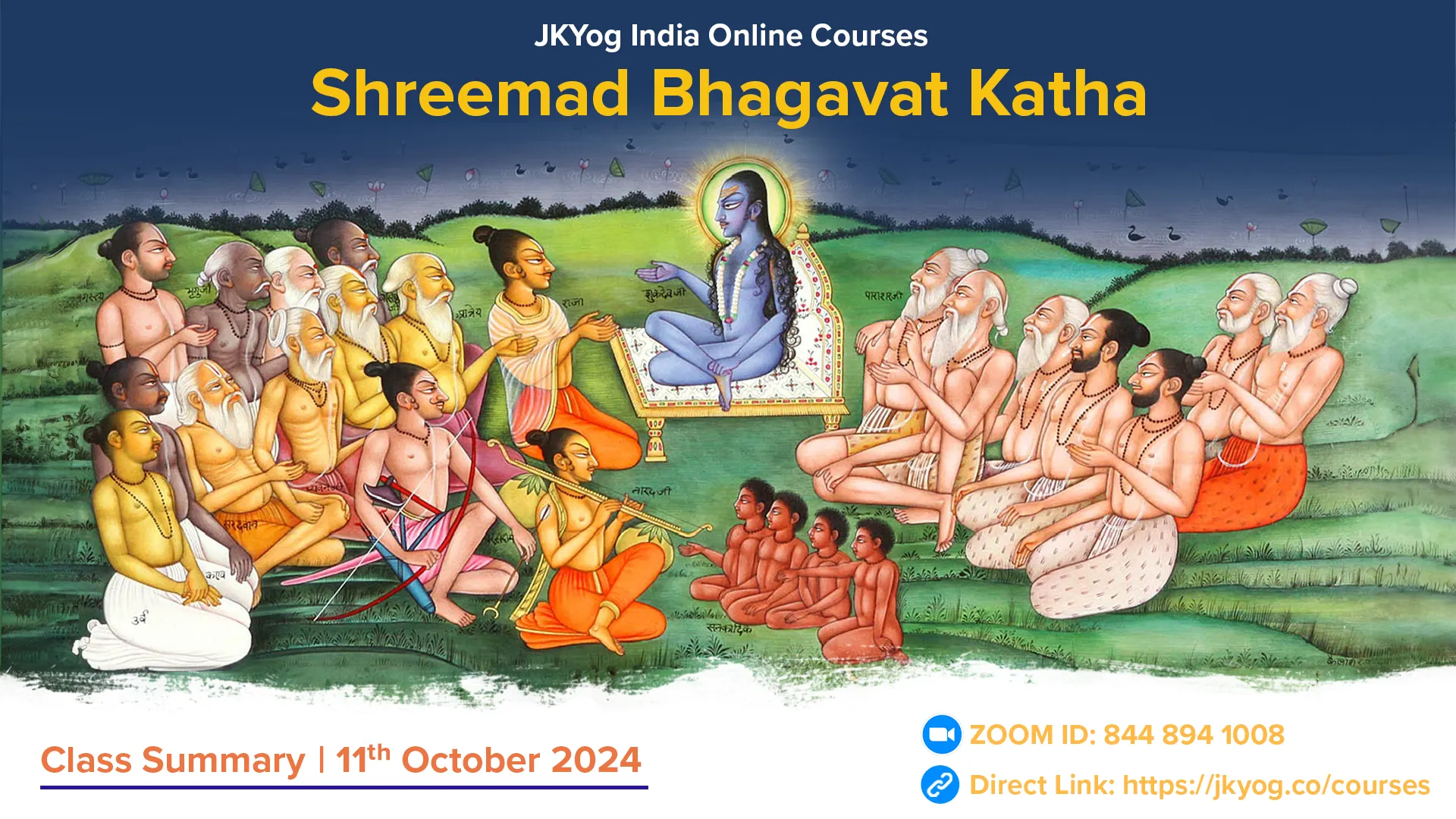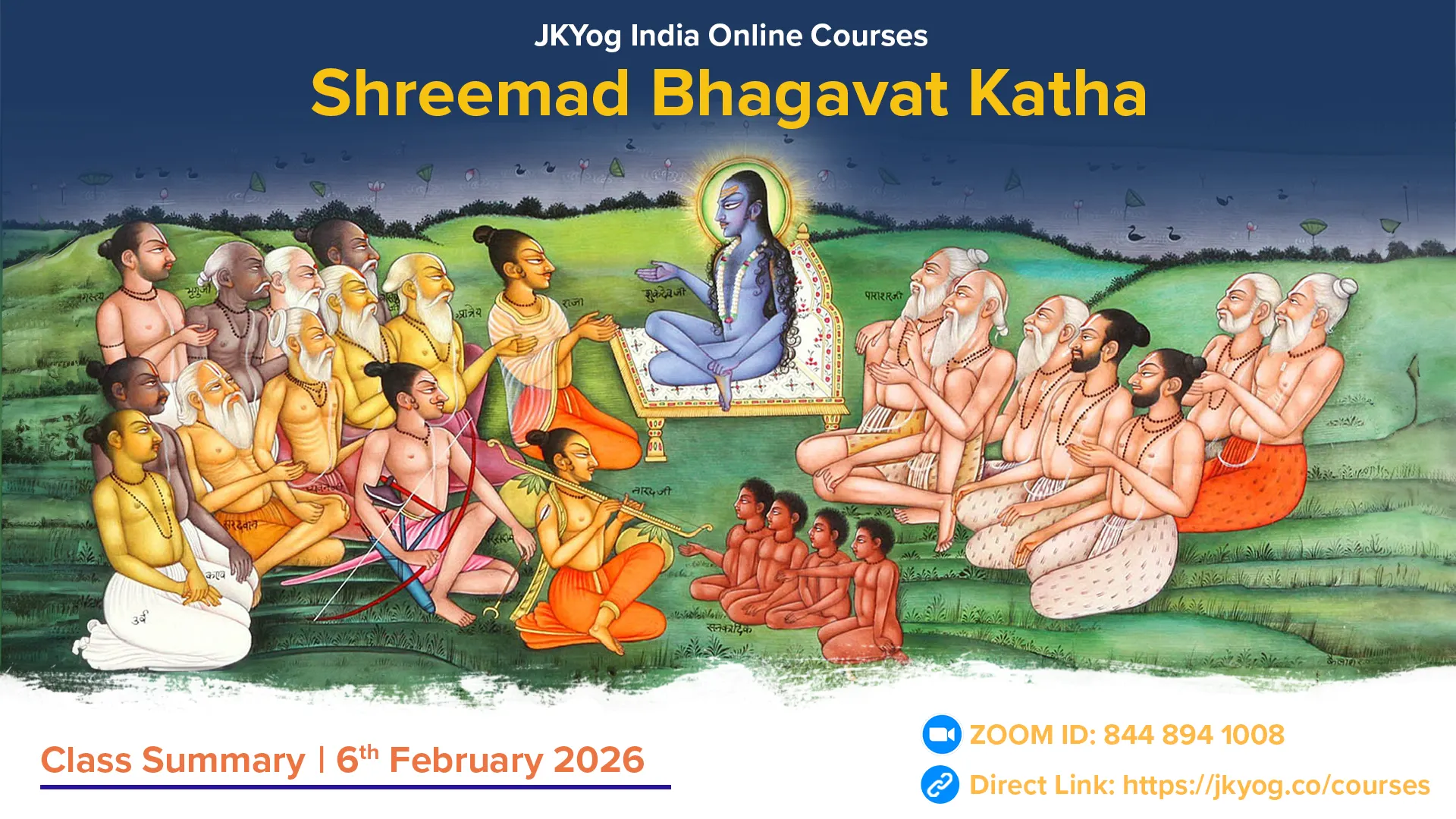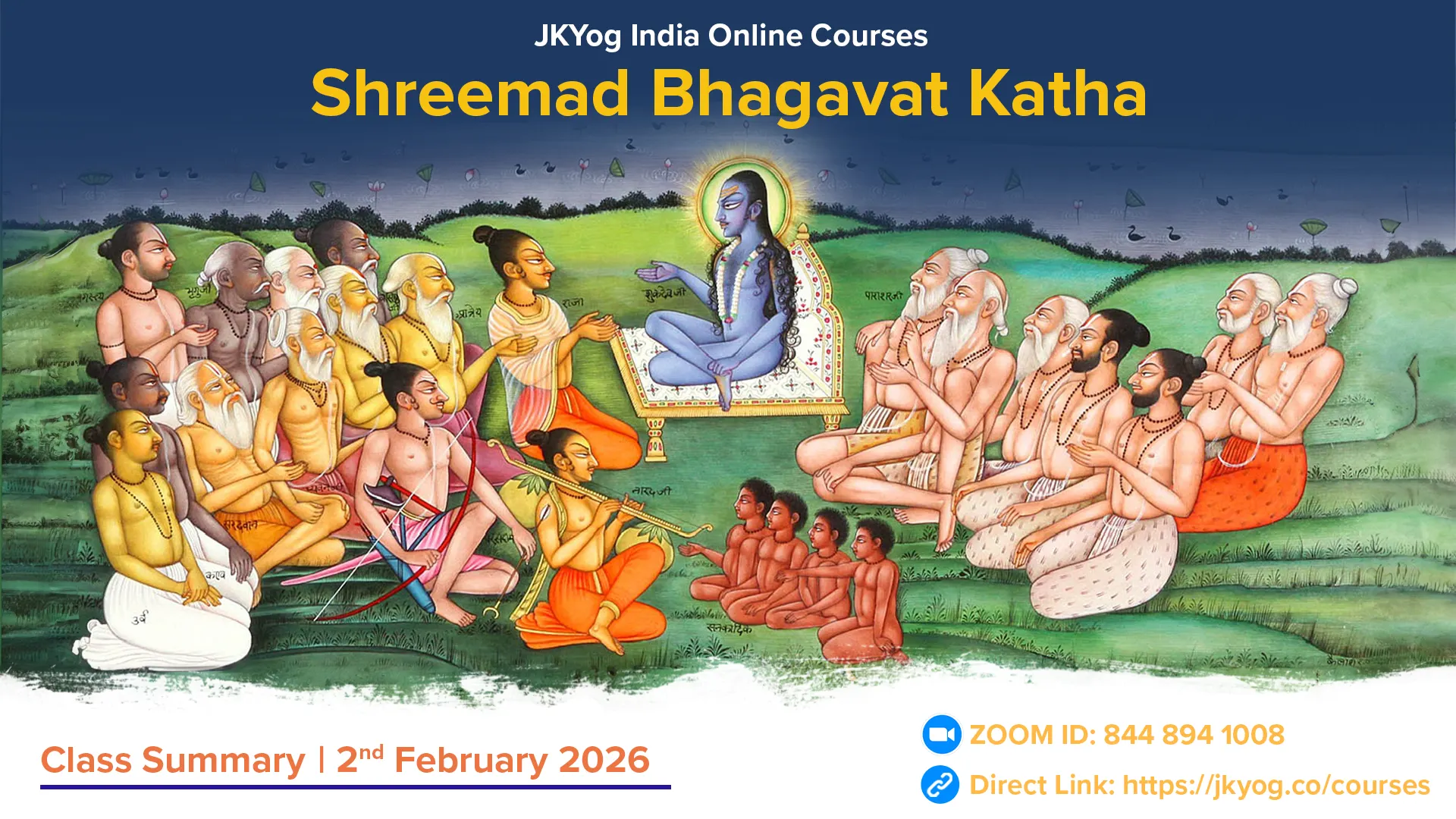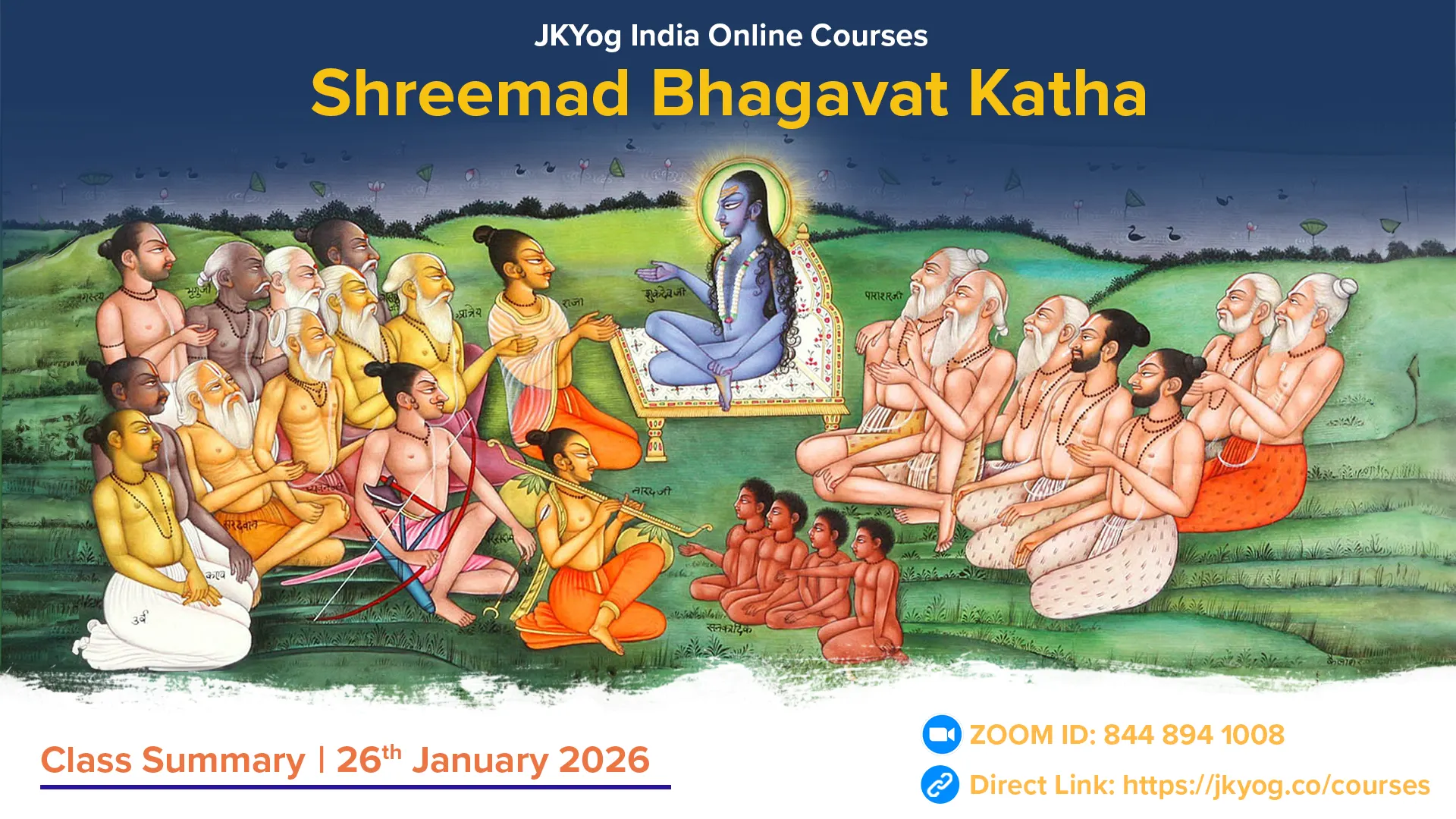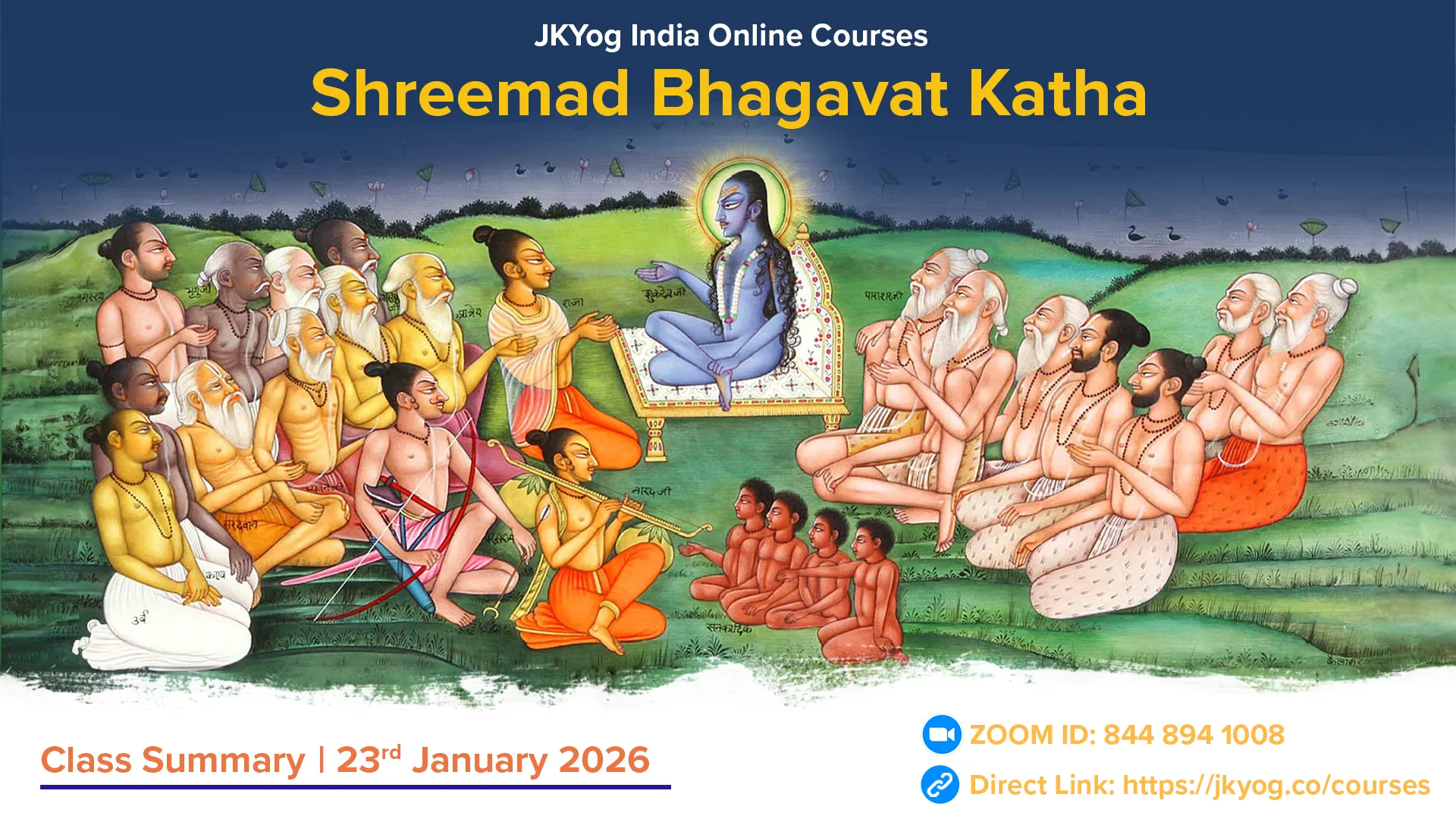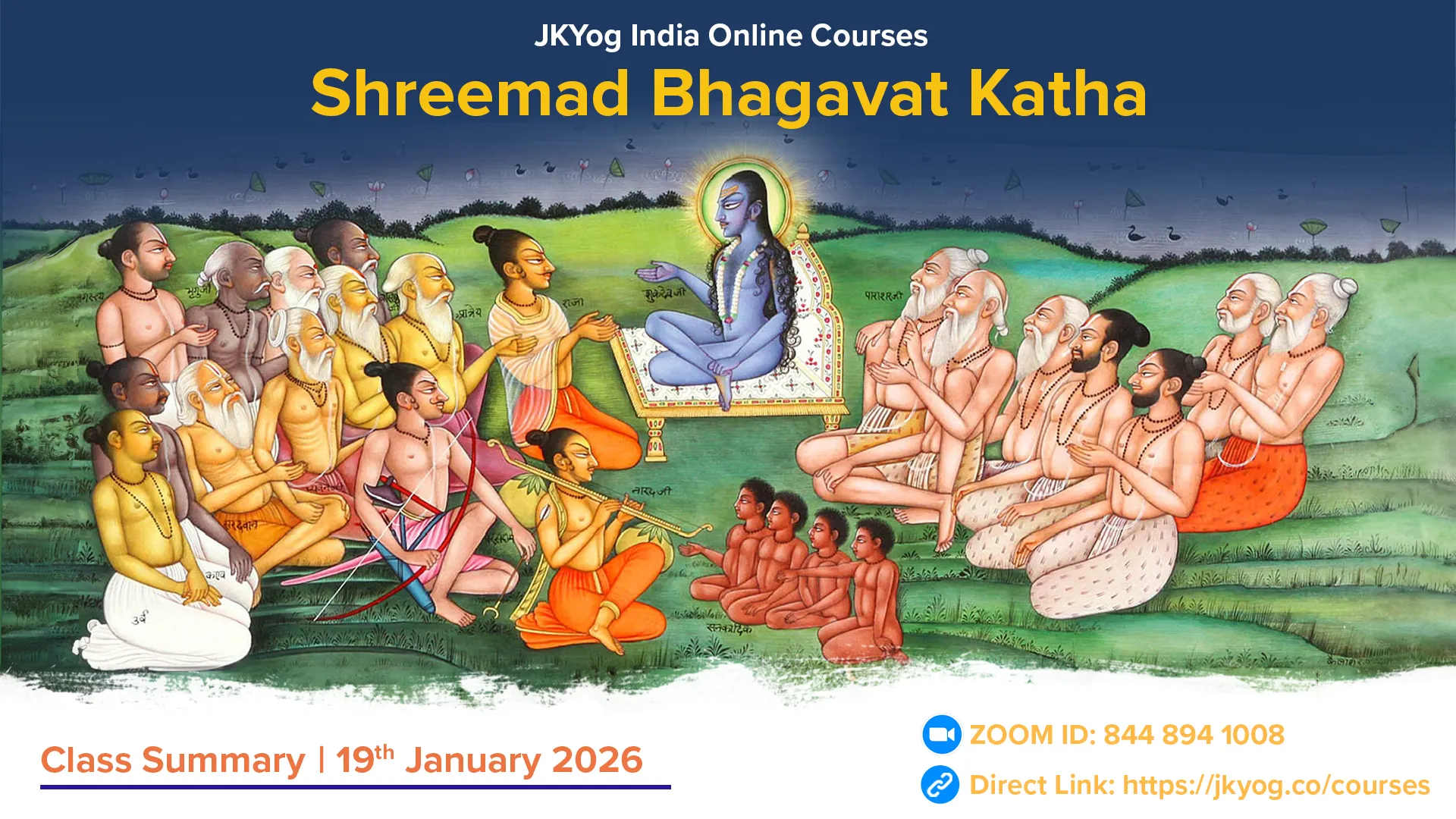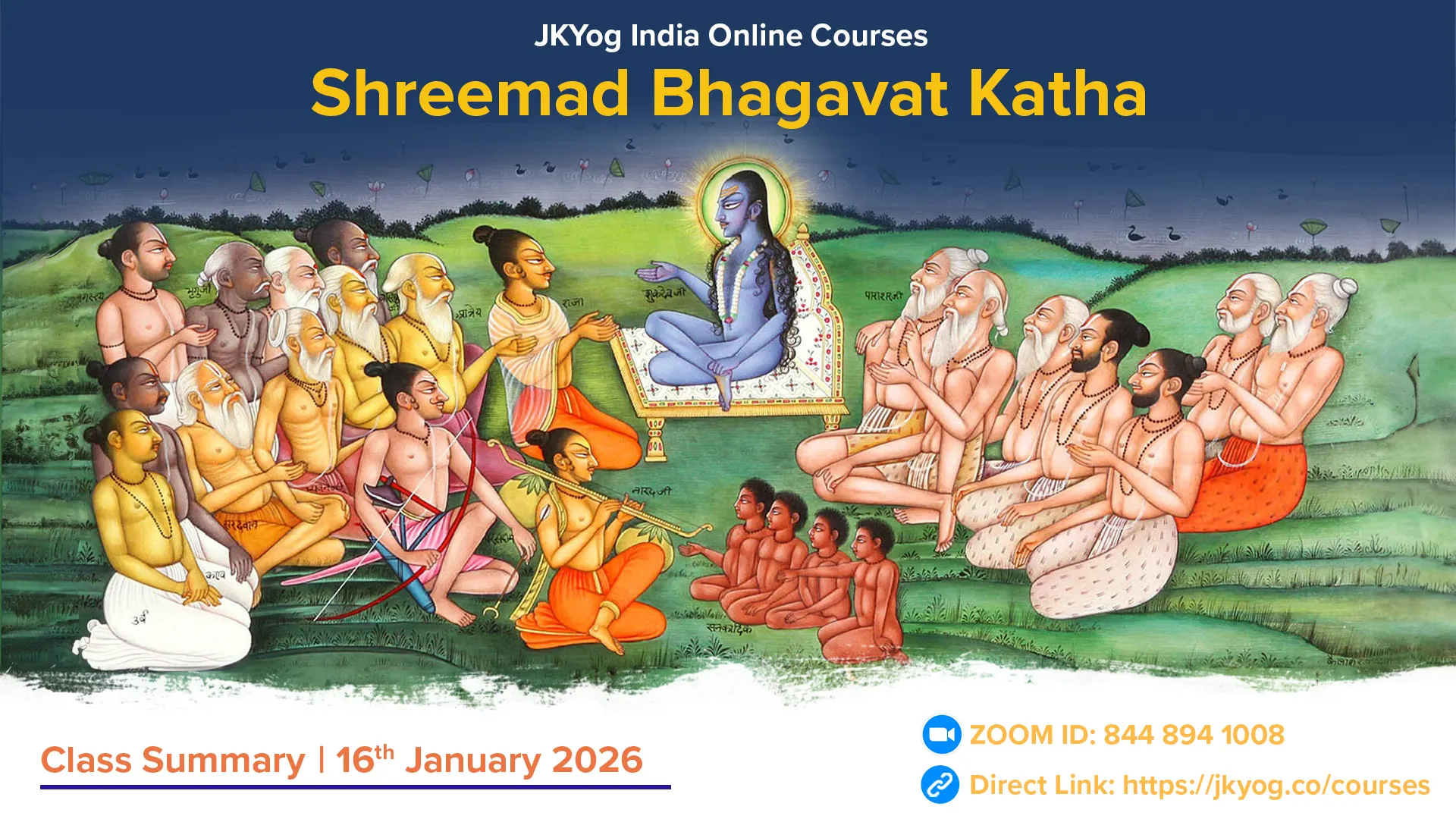Shreemad Bhagavat Mahapuran- Canto: 3, Chapters: 30 & 31
Sankhya Philosophy - Description of the downfall of men attached to body and family, and the description of the fate of soul attaining human body
Bhagwan Kapil tells Mata Devahuti that just as a cloud flying in the air does not understand the power of the wind, similarly, the soul, under the influence of the Kaal, wanders in various states and forms but does not realise its own immense strength.
Yam yam arthamupadatte dukkhena sukhaketave,
Tam tam dhunoti bhagavan pumanchhochati yatkrite.
The soul, desiring happiness, obtains various things with great difficulty; however, Bhagwan Kaal destroys those very things for which it feels deep sorrow. (Bhagavat 3.30.2)
The reason for this is that this dull-minded being mistakenly considers their perishable body, along with the house, car, wealth, etc., to be permanent due to attachment. In whichever species they take birth in the world, they begin to derive pleasure from that and do not separate from it. They become so bewildered by maya that they even feel happiness in hellish births and do not wish to leave them. This fool, attached to their body, spouse, children, home, wealth, and relatives, believes themselves to be very fortunate. Their entire being burns with the anxiety of their upkeep; nevertheless, due to a polluted heart, they continuously commit various sins for these attachments. Entangled in the false love of deceitful women and the sweet talk of children, a householder becomes embroiled in the sorrowful, false actions of domestic life. When they experience a little relief from sorrow, they begin to consider it happiness. They earn unethical wealth to support those who cause them to suffer in hell. They manage to live on the leftovers and, when unable to earn money, begin to covet the wealth of others. When they fail to support their family, they drown in worry. Their spouse and children start to neglect them. Yet, they do not develop detachment. In old age, they become ill and dependent on the family, living in dishonour at home. At the time of death, their pupils roll up due to the reverse flow of air, and the air passages become blocked with phlegm. They find it difficult to breathe and cough, experiencing a rattling in the throat. Surrounded by their grieving family, they cannot respond even when called due to the effects of death. A person who has not conquered their senses throughout their life and is solely engaged in the maintenance of the family dies in pain, unconscious among their weeping relatives.
At the time of death, two fearsome Yamadutas come to take him away. Seeing them, he becomes so terrified that he loses control and passes urine and stool. The Yamadutas seize him and throw him into a torturous body, binding him with ropes and forcibly taking him to Yamalok. His heart begins to race with fear from their threats, and his body trembles. Along the way, dogs tear at him, causing him to remember his sins and become restless. Tormented by hunger and thirst, burning in heat and fire, he collapses from exhaustion without water or rest. The Yamadutas whip his back, forcing him to move forward. He falls repeatedly along the way and becomes unconscious, but when he regains consciousness, he gets up again. In this way, in extreme agony, the Yamadutas take him to Yampuri along a dark path.
The path to Yamalok is 99,000 yojanas long. Covering such a long distance in two or three moments, he experiences various tortures in hell. In hell, his body is thrown into blazing wood and set on fire. Sometimes, his flesh is cut and fed back to him by himself or by others. The dogs or vultures of Yampuri tear out his intestines while he is still alive. His body is tormented by snakes, scorpions, and other biting and stinging creatures. His body is cut into pieces, crushed by elephants, thrown from mountain tops, or confined in water or pits. All these tortures, along with numerous other sufferings in hells like Tamisra, Andha-taamishra, and Raurava, must be endured by that being, whether male or female, due to the sins arising from their interactions.
Ekah prapadyate dhvantam hitvedam svakalewaram,
Kushaletarapathyeo bhutadrohen yad bhritam.
Leaving this body behind, he carries with him the sinful burdens he has gathered by betraying living beings, and he goes alone to hell. (Bhagavat 3.30.31)
Thus, after enduring numerous sufferings, a person who supports their family or merely fills their own stomach leaves both their family and body behind at death and bears the fruits of their sins. At that time, they are in distress, as if everything has been taken from them. A person who maintains their family through sinful earnings goes to the most painful hell known as "Andha-taamishra." There, after experiencing all the torments before human birth and the sufferings of species like pigs and dogs, they become purified and are reborn in human form.
The Condition of the Soul in the Mother's Womb
When a Jeev is destined to take birth in a human body, by God’s inspiration, it enters a woman’s womb through the man's sperm. In one night, it unites with the woman's menstrual fluid and takes the form of a thin membrane. Within five days, it becomes like a bubble, and by ten days, it solidifies a bit and takes on the shape of a berry. Then, it transforms into flesh or an egg. In one month, the head begins to form; in two months, hands, feet, and other limbs start to develop; and in three months, nails, hair, bones, skin, and male and female characteristics emerge.
In four months, the tissues of the body develop. By the fifth month, hunger and thirst begin to be felt, and in the sixth month, it starts to move within the amniotic sac in the right part of the womb. The tissues are nourished by the food and water consumed by the mother, but the fetus remains in a place filled with excrement teeming with worms and other parasites. Being delicate, it suffers immense pain when hungry parasites bite its limbs, causing it to faint repeatedly. The effects of the mother’s bitter, sharp, hot, salty, and sour food result in pain throughout the body.
The Jeev (in the form of a fetus) remains wrapped in the membrane, surrounded by intestines, with their head down and backs bent. It is like a bird confined in a cage, completely dependent and unable to move its limbs. Due to the inspiration of adrishta (God), it gains memory, recalling the deeds from its hundreds of past births. It becomes restless and feels as if it is suffocating. As the seventh month begins, the power of knowledge also awakens within the Jeev. However, due to the mother’s labour pains, it cannot remain still, just like the worms in the excrement produced in the womb. Then, this body made of the seven dhatus terrifies the being, who perceives itself as the body. In deep humility, it beseeches for mercy, folding its hands and praising Bhagwan, who has placed it in the mother’s womb.
The Soul's Pray to God from Mother's Womb
The being says, "I am very lowly, but the life that Bhagwan has shown me is due to my own deeds. He takes many forms to protect those who surrender to Him. Therefore, I also take refuge at His fearless feet." (Bhagavat 3.31.12)
"I, who am bound in this womb by the body, senses, and mind, covered by actions of virtue and sin, now bow down to that Supreme Soul, who is pure, unchanging, and indivisible, experienced in my tormented heart." (Bhagavat 3.31.13)
"Although I am indeed separate from the body and so on, I appear to be associated with the physical body due to this perception. Thus, I seem to be tied to the senses, qualities, sound, and ego, appearing like a reflection of consciousness. Therefore, I offer my homage to that Supreme Purush, the controller of maya (Prakriti/cosmic nature) and the soul, who is all-knowing and endowed with the power of knowledge, whose glory is never obstructed by the coverings of the body and so on." (Bhagavat 3.31.14)
"Due to the forgetfulness of my true nature caused by His maya, this being wanders in this world, bound by the qualities of goodness and other qualities, suffering various hardships. Therefore, without the grace of that Supreme Purush, how can this being attain knowledge of its true self?" (Bhagavat 3.31.15)
"The knowledge of the trikal (past, present, future) that I have attained, who else has given me that but Him? For He is present as the inner witness in all beings, both stationary and moving. Therefore, we, who are following the path of actions, worship that Supreme Being for the peace of our threefold afflictions." (Bhagavat 3.31.16)
"O Bhagwan! This embodied being is trapped in the well of excrement, urine, and blood inside another embodied being (in the womb of the mother), and the fire of digestion is greatly tormenting its body. It longs to come out and counts its months. O Bhagwan! When will this distressed being be released from here?" (Bhagavat 3.31.17)
"O Swami! You are extremely compassionate, and you, the generous Bhagwan, have given this being in the womb such supreme knowledge. O friend of the needy! Be pleased, for who can repay that kindness except by folding my hands in reverence?" (Bhagavat 3.31.18)
"O Prabhu! These animals, birds, and other beings in the world experience only the happiness and suffering that occurs in their bodies due to their dull intelligence, but by Your grace, I have attained a body endowed with control over my mind and senses. Therefore, with the intelligence bestowed upon me by You, the Eternal Person, I perceive You, both within and outside my body." (Bhagavat 3.31.19)
"O Bhagwan! Although I am suffering greatly in this womb filled with extreme misery, I do not wish to emerge from here and fall into the dark pit of this world, for upon entering, Your maya surrounds the being, causing the ego consciousness to arise within the body. As a result of this ego, the being becomes ensnared in the cycle of the world again." (Bhagavat 3.31.20)
"Thus, I will now abandon my restlessness and establish the feet of Shree Vishnu Bhagwan in my heart, using my intelligence to swiftly cross this ocean-like world so that I may not have to face the many faults and sufferings of this world again." (Bhagavat 3.31.21)
Sufferings of a Newborn
When the being in the womb reaches ten months and is thus endowed with awareness, it praises Bhagwan. At the time of delivery, the pushing force of the labouring air propels it out. Suddenly thrust out, the child emerges headfirst with great difficulty. At that moment, its breath stops, and it loses all previous memories. It lies on the ground, writhing in the blood and urine of the mother. All knowledge from its time in the womb is obliterated, and due to ignorance, it cries out loudly again and again.
Those who do not understand its intent raise and care for it. In such a situation, it lacks the strength to overcome the adversities it faces. When the being is laid on a filthy, dirty bed during infancy, where bedbugs and other creatures cling, it is unable to scratch its body, sit up, or turn over, and it suffers greatly. Its skin is very tender, and it is bitten by insects, mosquitoes, and bedbugs, just like larger insects are bitten by smaller ones. At this time, all its knowledge from the womb is lost, and apart from crying, it can do nothing.
How Does the Soul Get Trapped in the Vicious Cycle of Life and Death?
In this way, the child reaches youth after experiencing the sorrows of childhood and adolescence. At this time, if it does not receive the desired pleasures, its anger flares up out of ignorance, and it becomes engulfed in sorrow. As the ego and anger grow alongside the body, this being, driven by desire, takes enmity with other lustful men, leading to its own destruction.
This ignorant being, with a misguided intellect, develops an incessant sense of 'I-ness' and 'mine-ness' due to false identification with this body made of the five elements. Although this body subjects it to various sufferings like old age and is bound by ignorance and the chains of karma, it continues to engage in different actions. Being caught in these karmic entanglements repeatedly causes it to get trapped in the cycle of the world. If, while following the right path, it comes into contact with those who indulge in the pleasures of the tongue and genitals and starts to have faith in them and follow their ways, it again falls into the lower births, just like before.
Whom Should a Person Not Associate With?
Satya shaucham daya maunam buddhi shree hree yash kshama,
Shamo damo bhag cheti yat sangad yaati sankshayam.
Teshva shaante shoo moodheshw khandit atma swa sadhushu,
Sang na kuryaat shochyeshu yosht kride mrigeshu cha.
Truth, purity, compassion, silence, intellect, wealth, modesty, fame, and forgiveness—these qualities diminish when one associates with those who are restless, foolish, and lacking in virtue. One should not associate with such unsteady, foolish beings or with women who are like playthings. (Bhagavat 3.31.31-33)
Definition of Birth and Death
Jeevo hyasyaanugo deho bhoota indriya manomayaha,
Tannirodho'sya maranam aavirbhavastu sambhavaha.
The living being (soul) is indeed accompanied by a body composed of the elements, senses, and mind. The cessation (of the body) is called death, while the manifestation (of the body) is referred to as birth. (Bhagavat 3.31.31-44)
The living being (soul) travels from one realm to another through the medium of its designated body, which is also referred to as the subtle body or linga-sharira. During this journey, it experiences the fruits of its actions from previous births while simultaneously performing new actions to attain other bodies (new births). The subtle body remains with the soul until it achieves liberation (moksha), while the gross body (physical body), made up of the elements, senses, and mind, serves as the instrument of enjoyment for the soul. When the eyes lose their ability to see forms due to some defect, the eyes and the corresponding sense organ also become incapable of seeing forms. When both the eyes and the sense organ within them can no longer perceive forms, the living being also loses that capacity. Therefore, a person seeking liberation should not fear death. Instead, they should calmly navigate life with a detached attitude, understanding the true nature of the self. In this illusory world, one should regard the body as a mere inheritance, maintaining detachment while practising yoga and renunciation along with the right knowledge.
Summary: JKYog India Online Class- Shreemad Bhagavat Katha [Hindi]- 11.10.2024

